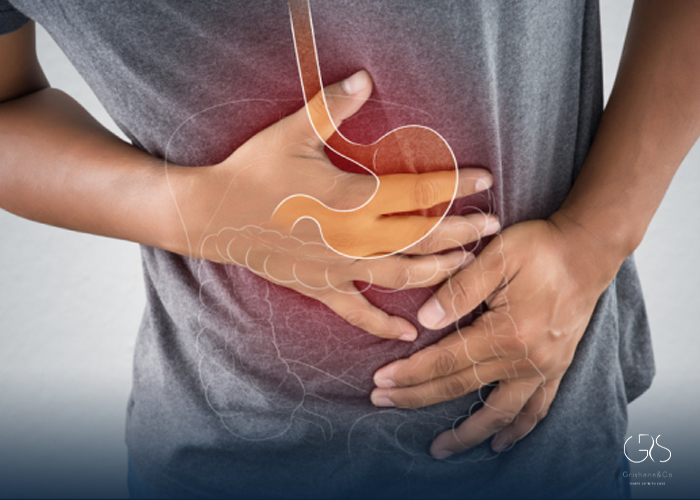Peptic ulcer disease (PUD) is a common gastrointestinal condition that affects millions of people worldwide. It is characterized by the development of open sores, or ulcers, in the lining of the stomach or the small intestine. Being aware of the signs and symptoms of peptic ulcer disease is crucial for early detection and prompt medical intervention. In this article, we will explore the common symptoms, advanced symptoms, and when to contact a healthcare provider.
Common Symptoms of Peptic Ulcer Disease
Abdominal Pain: A sharp, burning pain in the upper abdomen is one of the most common symptoms experienced by individuals with peptic ulcer disease. The pain is often described as a gnawing or cramp-like sensation and typically occurs between the breastbone and the navel. It may come and go, and can be worse on an empty stomach or at night.

Heartburn and Indigestion: Many people with peptic ulcers experience heartburn, a burning sensation in the chest that may occur after eating or lying down. Indigestion, bloating, and belching are also commonly reported symptoms.
Nausea and Vomiting: Some individuals with peptic ulcers may experience persistent nausea and episodic vomiting, particularly if the ulcers are accompanied by gastric outlet obstruction or other complications.

Changes in Appetite and Unintended Weight Loss: Peptic ulcer disease can lead to a decrease in appetite and unintended weight loss due to the discomfort associated with eating.
Dark, Tarry Stools: In cases where there is gastrointestinal bleeding, the blood may pass through the digestive tract and result in dark, tarry stools. This potentially indicates bleeding from a peptic ulcer located in the stomach or duodenum.
Advanced Symptoms of Peptic Ulcer Disease
While some individuals may only experience the common symptoms mentioned above, others may develop more advanced signs, indicating potential complications. These advanced symptoms may include:
- Severe Abdominal Pain: The pain associated with peptic ulcers may become more intense and prolonged, indicating a more severe condition or complication such as perforation or penetration of the ulcer.
- Vomiting Blood: If bleeding from a peptic ulcer is significant, it may result in the vomiting of blood, which can appear bright red or resemble coffee grounds. This is a medical emergency and requires immediate attention.
- Black, Tarry Stools: Gastrointestinal bleeding can also lead to the passage of black, tarry stools known as melena. This suggests bleeding from higher up in the digestive tract, such as the stomach or esophagus.
- Weakness and Fatigue: Chronic or severe peptic ulcer disease may cause a decline in overall health, resulting in weakness, fatigue, and a lack of energy.

When to Contact a Healthcare Provider
It is important to seek medical attention if you experience any of the following:
- Severe and Prolonged Abdominal Pain: If the pain is intense, does not go away, or is accompanied by other concerning symptoms, it is recommended to contact a healthcare provider.
- Vomiting Blood or Passing Black Stools: Blood in vomit or black, tarry stools indicate bleeding and require immediate medical attention.
- Unintended Weight Loss and Fatigue: If you are experiencing significant weight loss without intending to, or if you constantly feel weak and fatigued, it is important to consult with a healthcare provider.
Diverse Perspectives
It’s worth noting that the signs and symptoms of peptic ulcer disease may vary among individuals, and different populations may present with specific characteristics. Factors such as age, underlying health conditions, lifestyle choices, and cultural factors can affect how peptic ulcers manifest and impact a person’s daily life. Healthcare providers should consider a diverse range of perspectives when diagnosing and managing peptic ulcer disease in various populations.
Relevant Statistics
Approximately 4 million Americans are diagnosed with peptic ulcer disease each year, and around 10% of individuals in the United States will develop a peptic ulcer at some point in their lives1. Globally, the prevalence of peptic ulcer disease is estimated to be around 10%. These statistics highlight the significance of this condition and the need for early detection and appropriate management.
Conclusion
Peptic ulcer disease can cause significant discomfort and impact a person’s overall well-being. Recognizing the signs and symptoms is crucial for early detection, timely intervention, and the prevention of complications. If you experience any symptoms suggestive of peptic ulcer disease or if your symptoms worsen or persist, it is advisable to consult with a healthcare provider for an accurate diagnosis and appropriate management.
